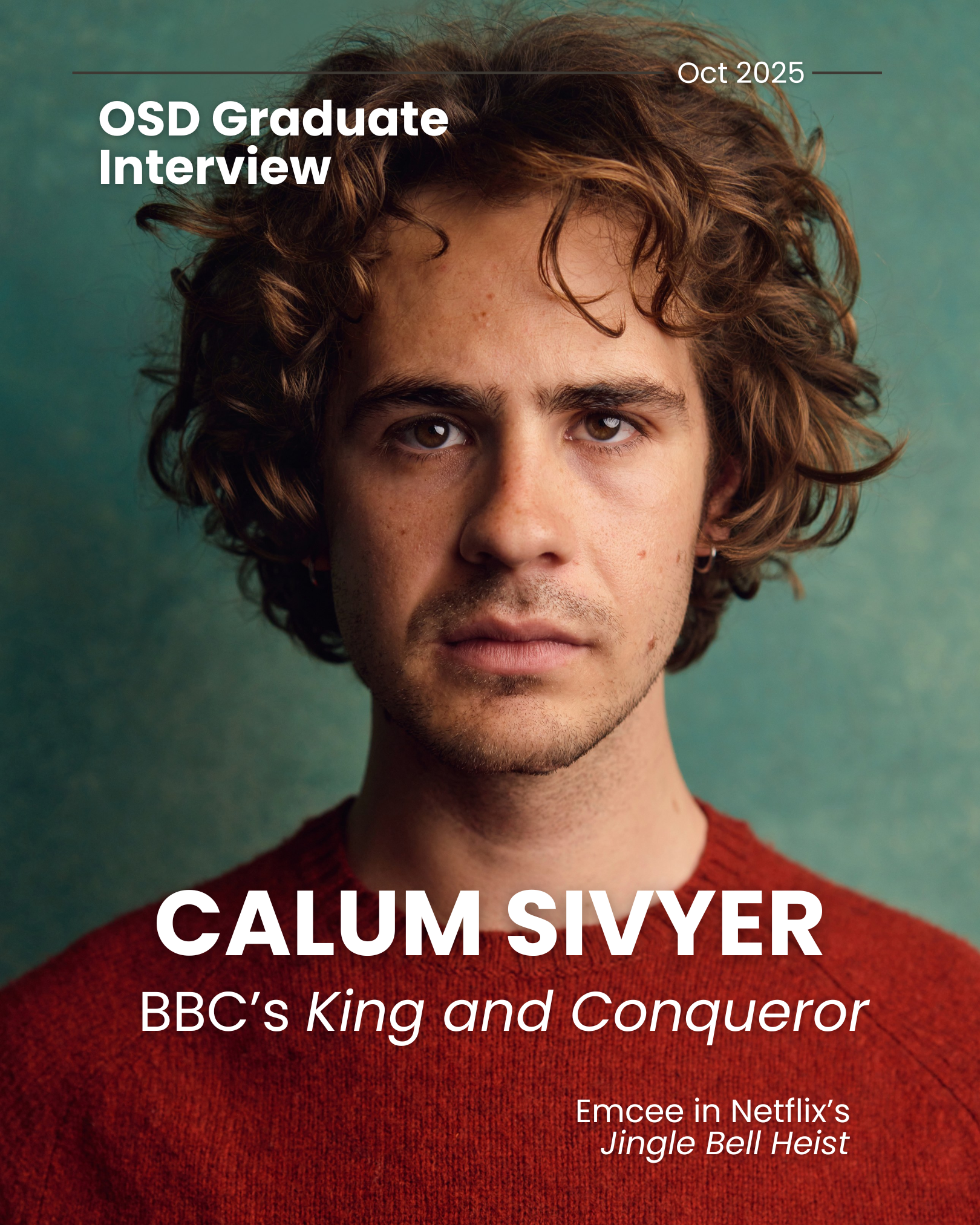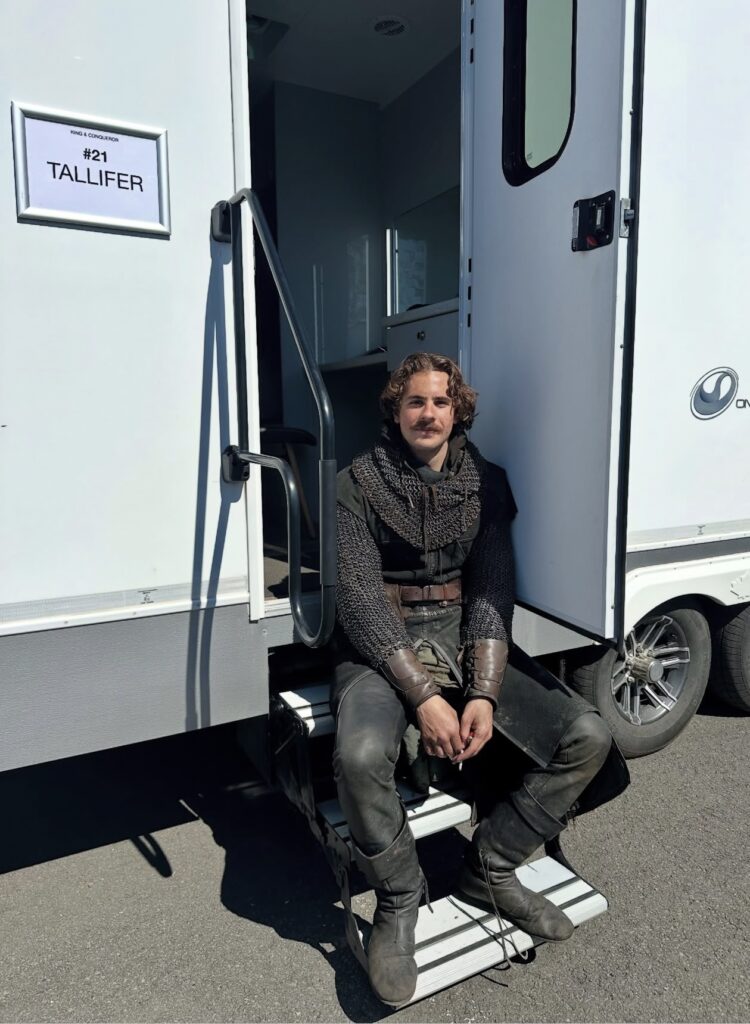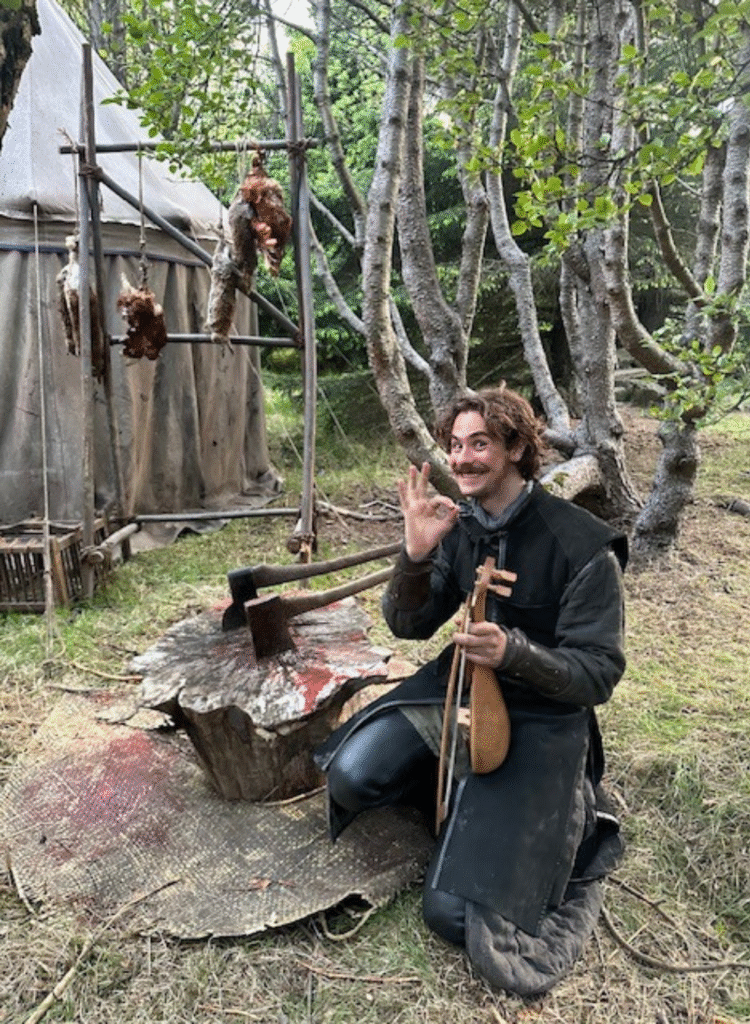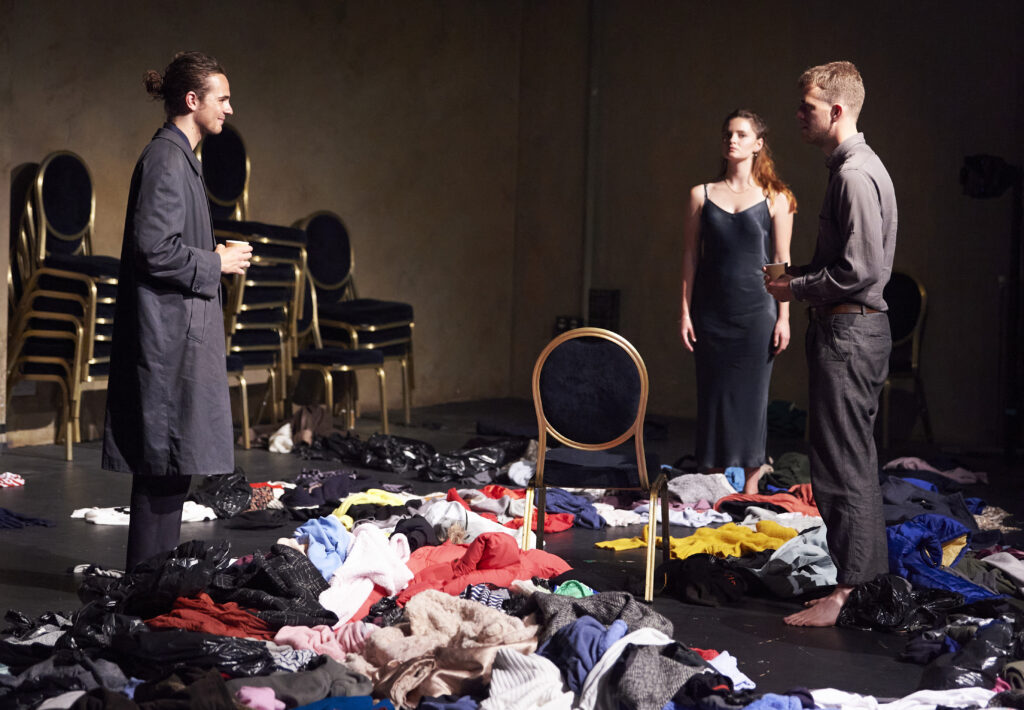
Calum graduated from the One Year Course in 2020. His credits include BBC’s Doctors and Casualty, ITV’s Breaking the Band, and the upcoming Netflix Christmas comedy Jingle Bell Heist. A fun bit of trivia: his first screen role was as Tom Riddle’s double in Harry Potter and the Half-Blood Prince.
We recently caught up with Calum to talk about his latest project, the BBC series King and Conqueror, starring James Norton and Nikolaj Coster-Waldau, as well as his time here at OSD.
By Omi Mantri
Firstly, congrats on King and conqueror! How was the filming?
It was like stepping into Lord of the Rings. The production was massive! Swords, horses, special effects, fake heads, bloodied bodies, and people flying around with bayonets. During the big battle scenes, I just thought, this is what filmmaking’s all about. This is why I became an actor. To pretend to be a Norman soldier and smack another actor on the head.

What was the audition process like?
Intimidatingly simple! I thought it’d be a big process: self-tapes, meet the director, do a chemistry test with the lead actors. But it was just one self-tape with two long scenes. Then… nothing. Weeks turned into months, and I thought, yeah, I’ve not got this. About a year and a half later, I was in quite a low place in my career. I thought, this sucks. That’s it. I’m done. It was like, the universe heard me. And then I got the call: “You’re going to Iceland in two weeks.” I was like, hang on they’ve only seen one self-tape! But once I got there and met the director, Nikolai, and James, I was more relaxed.
Wow! Were there any other steps?
Before confirming me, they did a sort of investigatory phone call. My agent said there was interest, but I had to chat with the casting director. I was driving to Cornwall, got a FaceTime from Dixie Chassay Casting, pulled over near a McDonald’s on the M5, and took the call. I thought I’d need to redo scenes or talk about my process, but it was more, “What music do you like?”. It turned out super chill. They were just checking if I could handle being on location for five months. Apparently, I passed! I’d sent the tape in 2021, and we started filming in 2022.
A year and a half. That’s a long time! How different was the final scene compared to your self-tape?
When you get to set, your instinct is to try and replicate the self-tape. I had a lot of time to prep, and I found that whenever I tried to recreate something from my first tape, or something I rehearsed in the hotel mirror the night before, it usually didn’t work.
In the end, the final scene turned out completely different. I decided not to overthink or over-prepare. I just went in with a clear head and open heart. And honestly, that’s when things clicked. The best results came when I wasn’t forcing anything.

What was your most memorable moment during filming?
Probably my first scene on set with the director [Nikolaj Coster-Waldau]. It was a pretty intense scene.
*Spoilers ahead*
My character, Tallifer, finds out his lover, a Norman soldier, is sent on a suicide mission and he’ll never see him again. So, high stakes, high emotions. I thought, “Oh Jesus Christ, on my first day on set, I’ve got to deliver this powerhouse performance.”
The scene was in a tent, and I had to confront William the Conqueror about sending him to his death. I went in, said, “Hi, Nikolaj! How are you?” and he didn’t say anything to me. He gave me the coldest, sternest look, no hello back. I immediately got the message: “We’re in character now.” That moment set the tone for the scene. That was his approach to calm me down and help me settle into the scene.
Also, the Battle of Hastings was pretty intense. I was in the middle of about 400 supporting artists and some lead actors. With the armour, costumes, swords, blood flying, and music pumping, you really get amped up. It felt like I was actually in the Battle of Hastings, and I had to remind myself to stay calm before I accidentally hurt someone!
What was the biggest thing that you learned working on this series, especially on a series of this scale?
Weirdly, just the importance of being in a good mood. Sounds simple, but I realised the hour before you starting shooting is crucial. Whether you’re in your trailer, the green room, or in the makeup chair, how you spend that time really affects your performance.
If you use that hour to listen to some sad music to make you sad or think of your dog dying to provoke an emotion, that’s usually when I’d go on set and I’d be tense in my body and anxious, with my brain in overdrive. But on days when I was chatting with people, listening to music, or just moving around, I felt at my best.
Sometimes I’d put on some folky music and dance around my trailer. Do a bit of free movement to get into my body and be present, shoutout Kirsty McFarland [Head of Movement and the Three Year Course at OSD]. Being in a good mood gave me the mental and physical freedom to do my best work.
You will also be appearing in Netflix’s Jingle Bell Heist. Can you tell us anything about that project?
The audition was really fun! I was lucky because the work I’d been doing after drama school was cabaret theatre and clowning. Basically, getting on stage in a silly costume with a mic, taking the piss out of the audience, and just doing whatever I could to get a laugh.
The character in Jingle Bell Heist is an MC host who’s always drunk and constantly messing around with the crowd. For the self-tape, I had to drink a pint, shout that Santa Claus was about to arrive, and dance around humiliating audience members.
Also, the director [Michael Fimognari] said before filming, “Do whatever you want. There are a few key lines, but otherwise, improvise, be silly. Take your top off if you want, drop your trousers, be disgusting and just have fun.” So yeah, it really was fun!
You’re also a talented guitar and ukulele player. How have these skills helped in your acting career?
It feels like every role I get cast in has something to do with music. Either I’m a musician, a hippie, or just some kind of alternative character. For my King and Conqueror self-tape, after my two scenes, they asked me to play a bit of music. Since it’s set in 1066, I’d brought out my banjo and played some medieval folk, which I happen to love.
When I got to set, they handed me a medieval instrument called a rebec and said, “You’ll be playing this in two weeks, you know how to play it right?” I was like, “No!” Luckily, my lessons started straight away, and by the end I could play Twinkle, Twinkle, Little Star decently.
Even though I wasn’t amazing, the musicality in my body helped. How to hold it, move with it, and not look like I was completely faking it. I think having that sense of rhythm and melody really helps in acting too. It affects how we move and how we understand language.


Have you always been interested in acting?
I’ve always been exposed to quite radical films. I remember being about eight when my dad showed me Eraserhead, Trainspotting, and Taxi Driver. That’s a very impressionable age, and I just remember thinking, “I don’t know how this makes me feel but, it’s interesting.”
At the same time, I was listening to a lot of unusual music growing up. Fairport Convention, The Blockheads, Zeppelin, Motörhead, Pink Floyd. I think that mix of film and music developed this very creative, curious, and playful mind.
Was there a particular moment in your life you decided to pursue acting?
A key moment was getting kicked out of my secondary school. Luckily, I lived near a theatre school, where you’d spend half the day on English, maths, and science, and the other half on ballet, tap, and Shakespeare. I got a place there, and from age 11 until GCSEs, that’s what I did. Ballet, tap, and a bit of maths when I felt like it.
Looking back, was there a time at the school that was of particular significance?
I always go back to Kirsty McFarland’s movement classes. Before training, I was constantly thinking, “How do I nail this scene? How do I analyse the character?” It was all quite heady and analytical. But when we started doing free movement with Kirsty, just putting on music and dancing, being totally present, suddenly everything started to fall into place in a weirdly simple way.
Your head’s always public enemy number one, and Kirsty was amazing at getting us rooted in the present.
Also, Ed’s film class. We were all given scenes, and before each one, he’d play a different type of director. For one scene, he was laid-back and collaborative. When it was my turn, he played the director who had zero time and didn’t care about your process. Obviously, it was to teach us something and it worked.
I realised then that most directors won’t care about your backstory or your character work. What matters is being able to tune in, block everything out, focus on your scene partner, and just do it. Ed literally counted us in, “We’ve got no time, we’re shooting in 5, 4, 3, 2, 1.” and we had to go. That lesson really stuck with me.
When did you decide you wanted to go to drama school?
I’d been acting for a while. I started professionally around age 10. Funny enough, my first job was as Tom Riddle’s double in Harry Potter. It was mostly the back of my hands and the side of my face.
But over time, I realised I had no idea what I was doing. I’d get a script and just try to mimic something I saw Robert De Niro do the night before. I loved acting so much, but I felt like a bit of a fraud. That’s when I thought, “Maybe I should go to drama school.”
Something about OSD stood out. There was a sense of tranquillity. The holistic approach they spoke about, and the fact it was literally in the middle of nowhere. There was something beautiful about that. Being out in nature, on a farm, learning to act and doing silly voices. I just thought ‘Yeah, this is the place for me.’

How did you find transitioning from drama school to the industry?
I graduated in 2020… so yeah, not the best timing. COVID had just hit, there wasn’t much work, and I didn’t have loads of agent interest, which was fine, they had their hands full too.
One day, I was on Mandy (the casting site) and spotted an open audition for a cabaret at The Windmill Theatre. The casting call read something like: “Where the stage ends. Immersive theatre. Clowning. Musicians wanted.” And I thought, yeah, I can do that.
I brought a puppet (even though I’d never done puppetry), a guitar, and did a cover of Cardi B’s WAP… with the puppet. No idea what I was thinking, but I got the job.
For the next three years, I was deep in that cabaret world. Working alongside sword swallowers, contortionists, aerial artists, and drag queens.
My job was to get on stage and make people laugh, unscripted. It was all improv-based, and I kept thinking back to Michaela [Michaela Miranda, Movement Tutor] and our improv classes. Jump in, no fear, be happy to fail, and figure it out as you go.
That cabaret job became my bread and butter. Between big jobs like King and Conqueror, I’ve got that safety net of immersive theatre.
How important is it for actors nowadays to create their own work?
Very important, just for the longevity of your career. There are always going to be periods where absolutely nothing is happening, and it’s rarely to do with your talent. That’s why I loved how at OSD they instilled the idea that creating your own work is essential.
After graduating, me and another student, Rosanna Adams, created our own gig theatre piece, a kind of folk opera. We took it to The Other Palace, then to the Edinburgh Fringe. It was such a beautiful, creative time. Writing songs, writing scripts, trying on costumes, and just making something from nothing.
There’s honestly nothing better than starting with a blank canvas and bringing something to life. It teaches you the graft, the resilience, and, if it’s not too crass to say, the pain of being an actor. Because this isn’t a one-year, five-year, or even ten-year career. It’s a lifelong thing. You’ve got to commit to it fully.
Whether it’s creating your own work, performing cabaret, or doing anything else that keeps you creatively active, it all helps build longevity. It takes time to hone your craft.
Not that I know anything! I mean, this advice implies that I’ve figured it all out, which I haven’t.

How did the project with Rosanna start?
We had an assignment in the second term, our SEP project [Self-Evaluated Project], which was right in the middle of COVID, so everything was online. Me and Rosie decided to create a song for it, and we ended up writing this kind of haunting folk ballad.
That became the starting point for what the show eventually turned into: The Greatest Hits of Lily and John. A two-hander folk opera that explored mental health, suicide prevention in men, and the power of just going for a walk when you’re feeling sad.
It was probably one of the hardest things I’ve ever done. Going to the Edinburgh Fringe is a rite of passage, but when you’re there as the artist, the producer, the advertiser, all rolled into one, it gets pretty intense. But the results were beautiful.
We got some amazing reviews, met brilliant people, and performed the show almost every day for 30 days.
That’s wonderful. Final question, is there anything you want to tell the readers?
Just keep an open heart and mind. Instant results don’t happen. Say yes. Say yes to any opportunity, even if it isn’t glamorous, or isn’t a project you fully believe in. Just say yes, and the world will open up to you. Sometimes…
Quick fire Questions
-
Film or TV?
Film -
Film or Theatre?
Film -
Classical or Contemporary work?
Classical -
Bodycon or Voicecon?
Bodycon -
Favourite subject at OSD?
Bodycon -
Favourite project at OSD?
Fear and Misery of the Third Reich by Bertolt Brecht and directed by Cathal Cleary -
Self-tape or In person auditions?
Self-tape -
What’s your favourite accent to do?
My own! -
What accent do you want to learn?
General American
